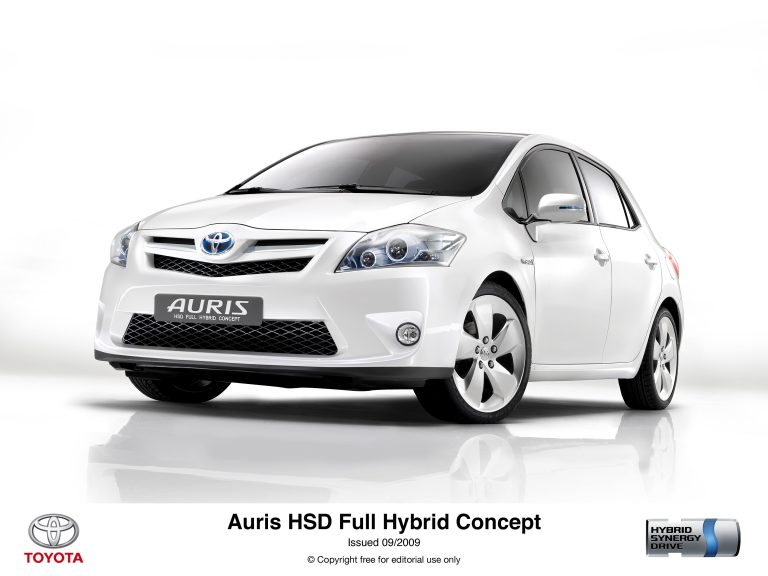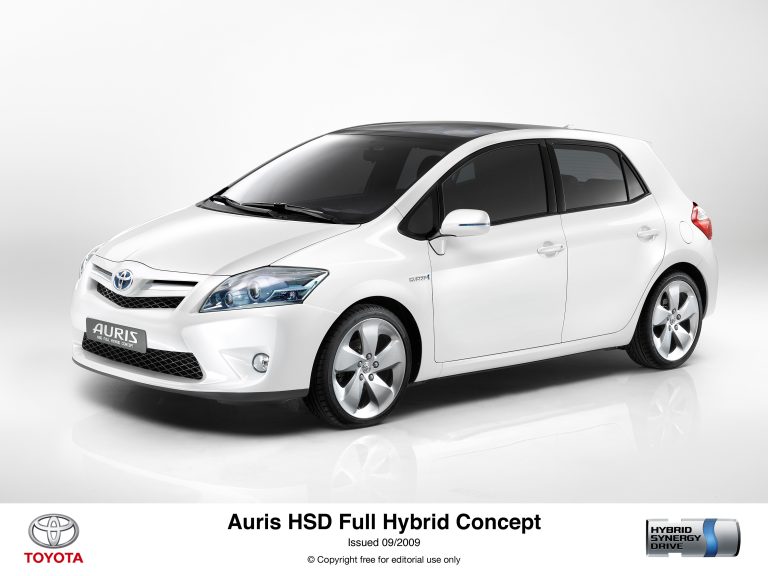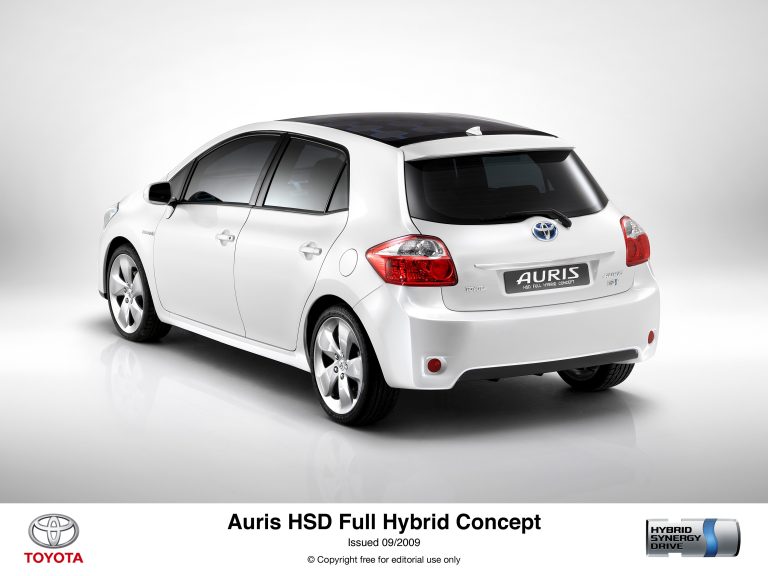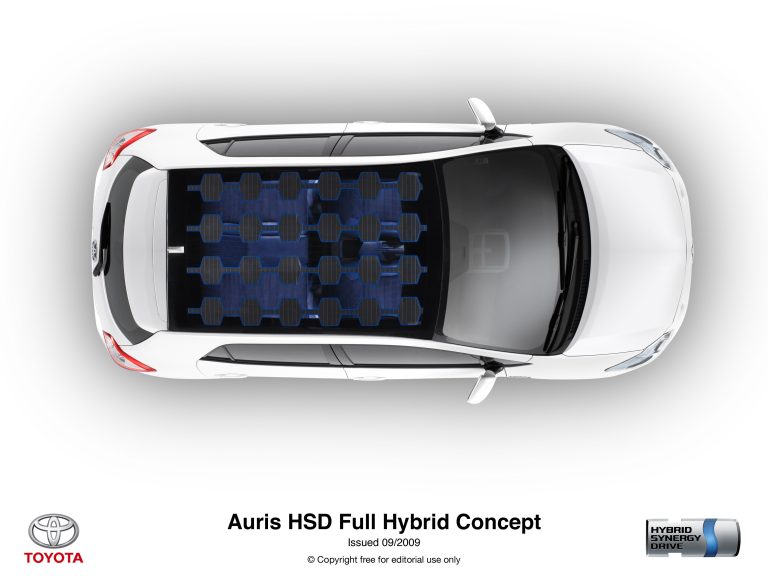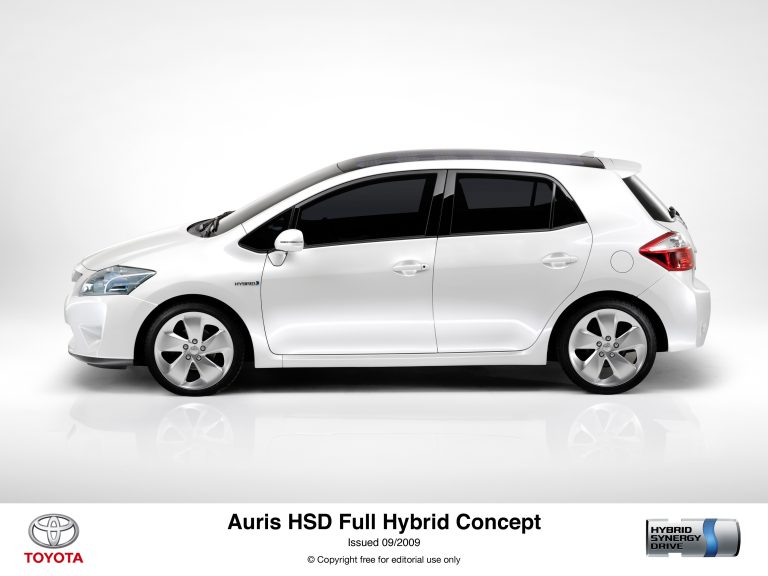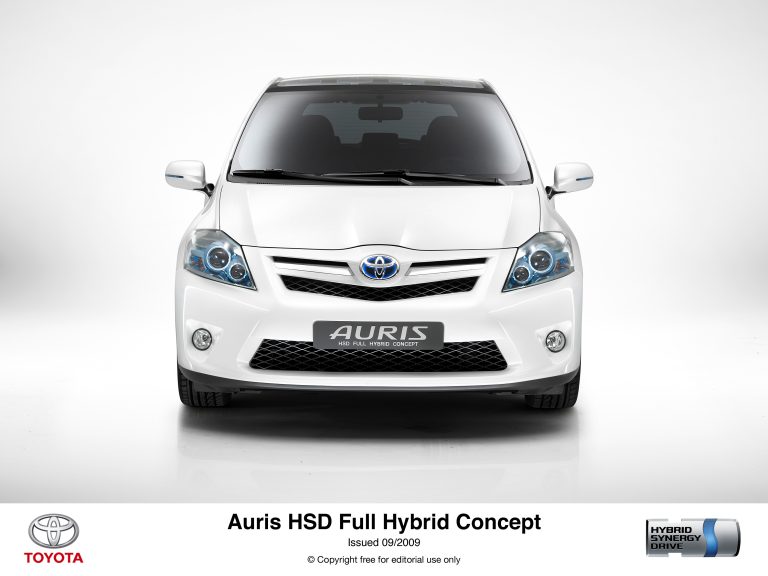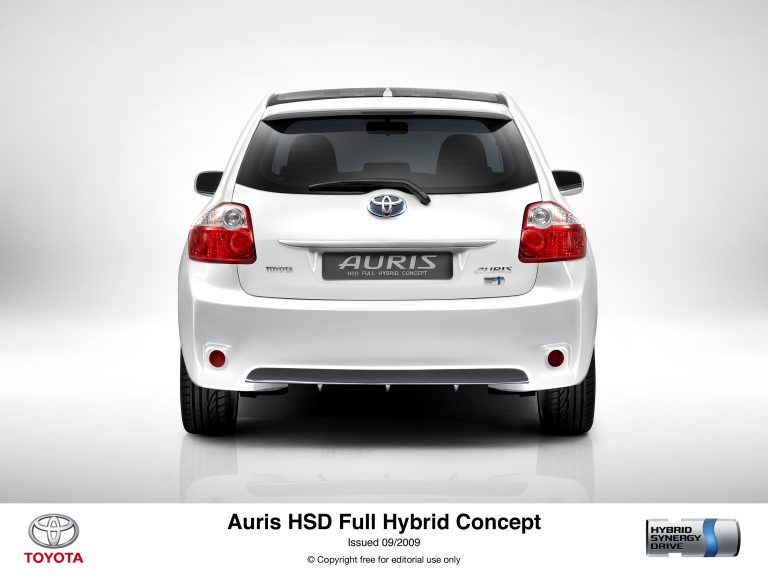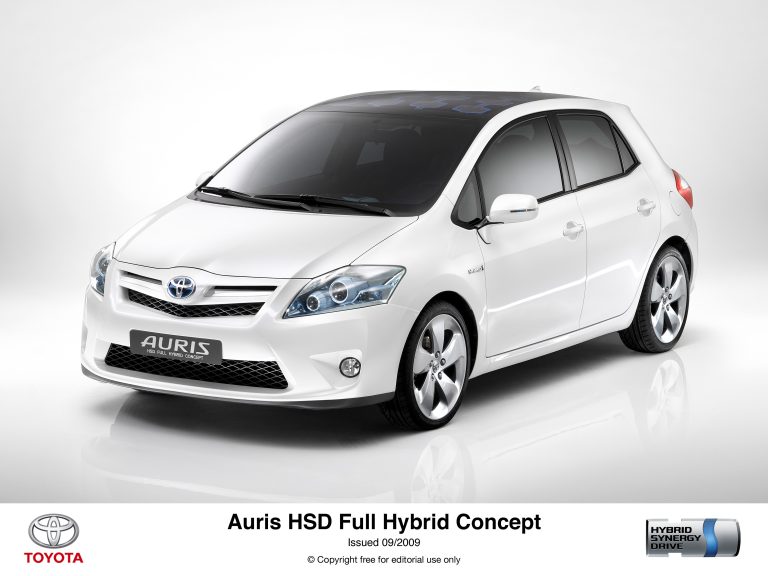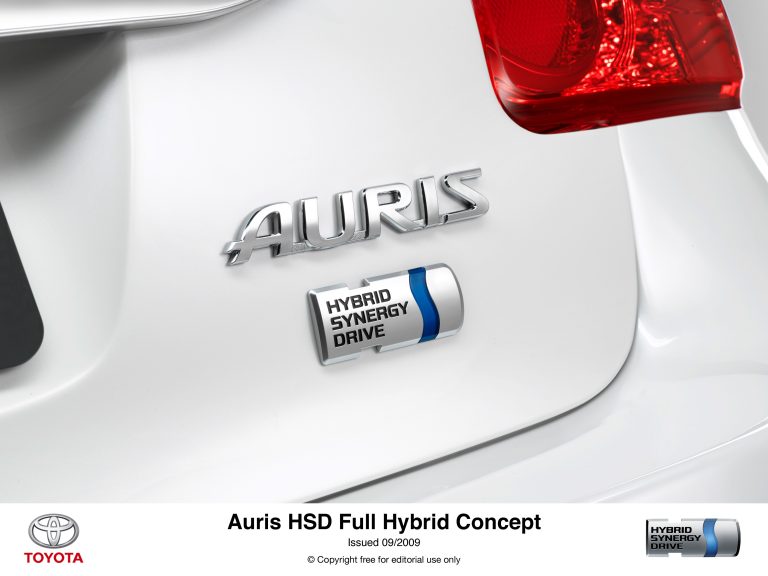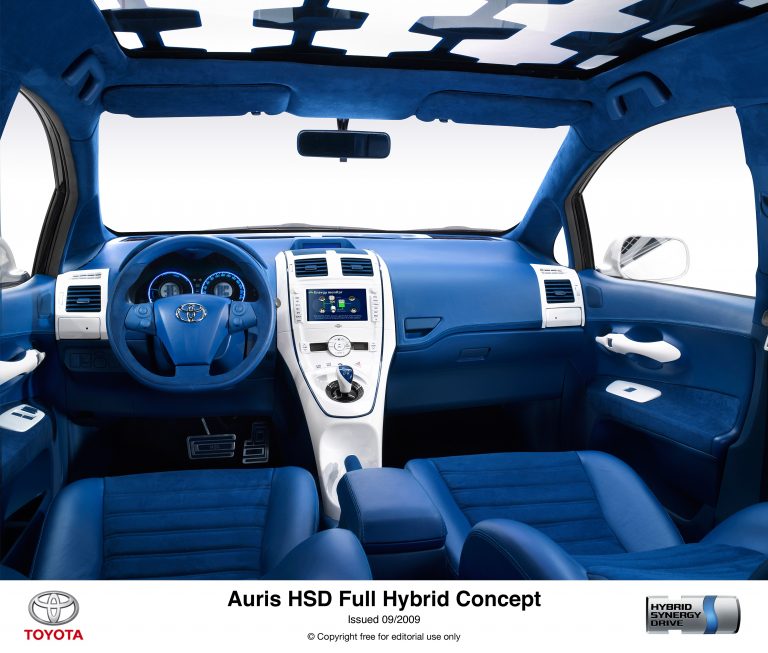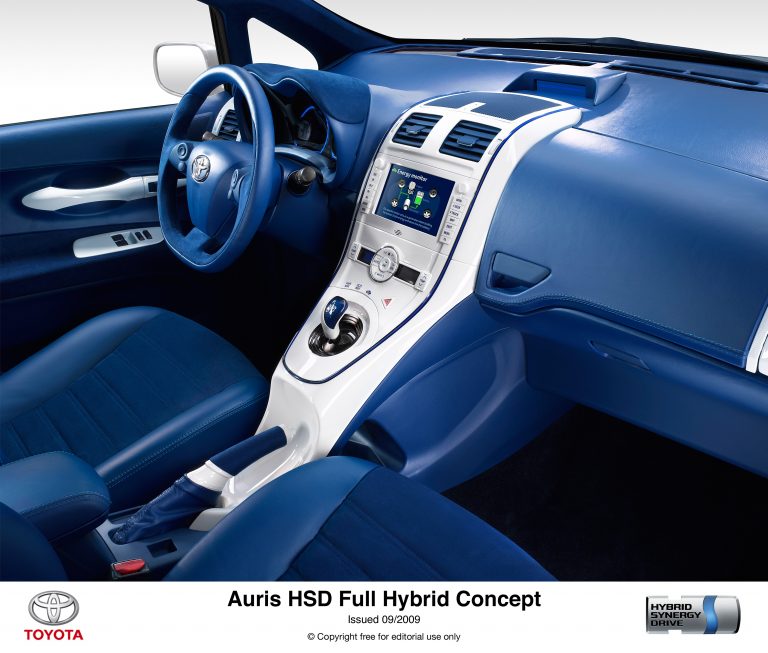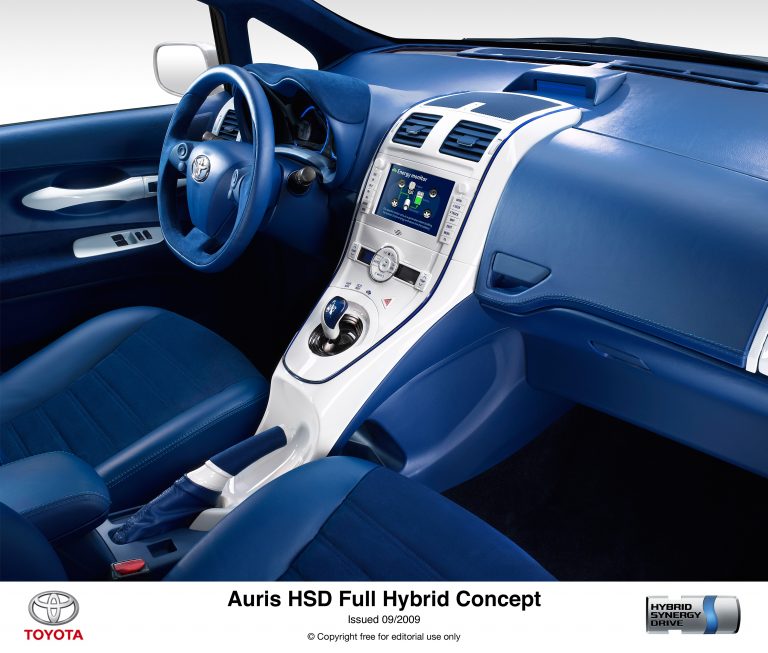Toyota Unveils Auris HSD Full Hybrid* Concept
Frankfurt motor show debut for precursor to Toyota’s first full hybrid mainstream European production model
KEY POINTS
- Concept previews new Auris HSD Full Hybrid, Toyota’s first full hybrid mainstream model in Europe
- World debut at the Frankfurt motor show
- Hybrid Synergy Drive powertrain, shared with latest generation Prius
- Sub-100g/km CO2 emissions, class-leading combined cycle fuel consumption and 0-62mph acceleration in around 10 seconds
- Detailed exterior styling changes to improve aerodynamic performance
- Extension of on-board solar power technology
- Auris HSD Full Hybrid production model to be built at TMUK’s Burnaston factory
- Sales scheduled to start during second half of 2010
* ‘Full Hybrid’ means the car can be driven on petrol engine alone, electric motor alone or combination of both. Not all hybrids can do this.
The new Auris HSD Full Hybrid Concept, presented publicly for the first time at the Frankfurt motor show, marks a significant milestone in Toyota’s plan to equip its mainstream European models with full hybrid technology. Toyota is committed to making the environmental benefits of its Hybrid Synergy Drive (HSD) accessible to a wider customer base and it is on track to offer a hybrid version of every model in its range by the early 2020s.
A five door hatchback is the best selling type of car in Europe and consequently the installation of HSD in Auris is the logical first step in deploying full hybrid technology across Toyota’s entire European model line-up.
By introducing the Auris HSD Full Hybrid Concept, Toyota also aims to shift customer perceptions of hybrid technology. The obvious advantages are exceptional fuel efficiency and low CO2 emissions, but customers will also experience smooth and sophisticated driving unlike any other family hatchback, thanks to the everyday usability, comfort and quietness of the Toyota full hybrid powertrain.
The Auris HSD Full Hybrid will be built by Toyota Motor Manufacturing UK (TMUK) at the Burnaston factory, near Derby, with sales scheduled to start during the second half of 2010.
The news that Europe’s first hybrid production model will be built in the UK has been welcomed by the British Government. Business Secretary Lord Mandelson said: “I’m delighted Toyota has chosen the UK to build its first hybrid vehicle in Europe. When I visited the Burnaston plant in July, I saw for myself the energy and commitment of Toyota and its workers. The unveiling of the new car at the Frankfurt Motor Show brings the vision of making the UK the best place in the world to develop low carbon vehicles a step closer. I look forward to seeing the cars roll off the line next year.”
Exterior design
The design of the Auris HSD Full Hybrid Concept reflects the installation of a full hybrid powertrain in a mainstream package. Subtle changes have been made to Auris’s styling to improve aerodynamic efficiency and blue hybrid badging identifies the car as a member of Toyota’s full hybrid fleet.
The front end is designed to optimise airflow and so help maximise fuel efficiency. The front and rear bumper corners have flat surfaces, a feature that not only accentuates the car’s wide and solid stance, but also smoothes the flow of air over the vehicle’s flanks, minimising turbulence and drag.
The ride height is lower by 20mm compared to the conventional Auris, and underbody panels and a rear diffuser have been fitted to smooth and control airflow beneath the car. The bespoke 18-inch alloy wheels are designed to cut air turbulence in the wheel arches and are shod with low rolling resistance tyres. A larger, more efficient rear spoiler is also fitted. These aerodynamic elements target a drag coefficient of 0.28.
Interior design
The cabin has a number of special features that are linked to the car’s full hybrid status.
The seats and upper dashboard are finished in blue Gaucholino leather with light blue accent stitching. To complement the exterior body colour, the centre console and side air vents have a tactile, pearl white finish.
The instrument cluster has hybrid blue illumination, with a design that combines high technology with easy-to-read displays. Alloy pedals reinforce the performance dimension of HSD technology and the steering wheel has a flat bottom section for easy driver access and better legroom.
Sequenced entry and exit lighting is provided, including puddle lights integrated in the door mirrors and ambient illumination of the footwells and headlining. Thick carpeting raises the on-board comfort and refinement levels and also contributes to a marked improvement in cabin quietness.
Refined driving experience
Using the same powertrain as the latest generation Prius, the Auris HSD Full Hybrid Concept is the first mainstream model in Europe to benefit from Toyota’s refined, smooth and quiet Hybrid Synergy Drive.
The car will accelerate from nought to 62mph in around 10 seconds, while returning class-leading combined cycle fuel economy and sub-100g/km CO2 emissions. It offers four driving modes, three of which can be selected on-demand by the driver: ECO mode maximises hybrid system efficiency and fuel economy; Power mode boosts performance; and EV mode – a feature only available with a full hybrid system – allows for ultra-quiet running on electric motor power alone for up to 1.25 miles (2km) at speeds up to 31mph, with zero fuel consumption and zero CO2 and particulates (PM) emissions.
Building on the inherent quietness of HSD, particular attention has been paid to further NVH reduction measures to achieve a calm, quiet cabin environment at all speeds. Road and engine noise have been suppressed by comprehensive use of soundproofing materials, and full thickness glazing and an acoustic windscreen reduce wind noise at cruising speeds.
Environmentally efficient technology
Using technology that was first brought to the market in the latest generation Prius, the Auris HSD Full Hybrid Concept marks a further development of solar powered ventilation, with solar panels covering the entire roof.
Similar technology is used inside the cabin, with solar panels on top of the dashboard that generate sufficient energy to recharge mobile phones or portable music plays mounted in purpose-designed charging trays. In the future, Toyota aims to advance this technology to provide solar powered recharging of the hybrid battery.
Further energy-saving measures include the use of LED technology for the front and rear lights.
Outline technical specifications
| ENGINE | |
| Displacement (cc) |
1,798 |
| Max. power (bhp) |
97 |
| Acceleration 0-62mph (sec) |
~10 (target) |
| MOTOR | |
| Type |
Permanent |
| TRANSMISSION | |
| Type |
Electronically |
| HV BATTERY | |
| Type |
Nickel-metal |
| EXHAUST EMISSIONS | |
| CO2 (g/km) |
<100 |
| EXTERIOR DIMENSIONS | |
| Overall length (mm) |
4,245 |
| Overall width (mm) |
1,760 |
| Overall height (mm) |
1,515 |
| Wheelbase (mm) |
2,600 |
Disclaimer
1. Fuel consumption and CO2 values are measured in a controlled environment, in accordance with the requirements of Directive 80/1268/EEC, including its amendments, on a basic production vehicle. For more information about the basic production vehicle, please contact the Toyota press office.
2. The fuel consumption and CO2 values of your vehicle may very from those measured. Driving behaviour, as well as other factors (such as road conditions, traffic, vehicle conditions, installed equipment, load, number of passenger, etc) play a role in determining a car’s fuel consumption and CO2 emissions.
ENDS

